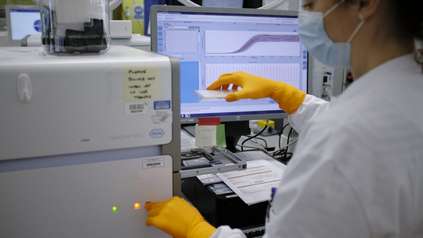Ambitious inflammatory bowel disease study aims to uncover disease biomarkers for personalised medicine
A new one-of-a-kind study into inflammatory bowel disease (IBD) is bringing together research institutions, hospitals, pharmaceutical partners, and patients to uncover what drives IBD onset and severity, identifying biomarkers to inform personalised medicine.
The largest study of its kind, Open-IBD1, will collect in-depth genomic and clinical data from 1,000 IBD patients from the UK at diagnosis and multiple points for up to four years, providing an invaluable data resource containing molecular, cellular, bacterial, viral, and genetic information.
Launching ahead of World IBD Day 2024, the project, funded by Open Targets and the Wellcome Sanger Institute*, ultimately aims to discover biomarkers to help improve patient care. These biomarkers could be used to monitor patients, identify who would benefit most from certain treatments, and find potential targets for new drug development. They could also highlight what causes and drives IBD, shedding light on why some patients’ condition progresses more quickly and severely than others.
IBD is an umbrella term for conditions that cause chronic gastrointestinal inflammation. The two main types are Crohn’s disease and ulcerative colitis. The majority of IBD research involves patients who have lived with their condition for many years and have tried multiple different therapies. These factors have made it difficult to understand what causes IBD and the key pathways involved in disease progression.
Open-IBD will overcome this problem by recruiting patients early when they are first referred to a hospital with suspected IBD and before any treatment has been given.
Open-IBD brings together experts from academic institutions across the UK and will be led by co-Chief Investigators, Dr Chris Lamb from Newcastle University and Dr Carl Anderson from the Wellcome Sanger Institute with recruitment by expert clinician scientists from specialist IBD clinics at seven hospitals2. Researchers aim to recruit the first patients by early 2025.
On referral to hospital, researchers will collect blood and stool samples from participants along with in-depth clinical information via questionnaires. In addition, they will have access to the biopsy samples taken when patients undergo a diagnostic colonoscopy.
Throughout the following two years, further samples will be taken at regular intervals, including during a second colonoscopy a year after diagnosis. Biopsy and blood samples will be analysed using single-cell RNA sequencing, and stool samples will undergo metagenomics shotgun sequencing and RNA gene sequencing3. DNA samples from all individuals will be sequenced to identify genetic factors underpinning disease progression and prognosis. Clinical information about disease course and treatment outcomes will continue to be collected up to four years from consent.
Working with Open Targets consortium’s pharmaceutical partners ensures that the anonymised data can be translated into patient benefit as quickly as possible. The data collected will also be open and accessible to researchers worldwide once published.
Open-IBD will fund a research nurse and a clinical PhD fellow at each of the seven hospitals to support its ambitious recruitment and analysis plan. The clinical fellows will be trained in genomics, big data and statistics, and be mentored by current experts to become the next generation of leaders in gastroenterology.
In addition to working with scientific experts, Open-IBD has been designed in collaboration with patients through multiple patient focus groups and assistance from Crohn’s & Colitis UK.
“This exciting project represents a unique opportunity to study newly diagnosed IBD patients with a focus on developing a greater understanding of the natural history of IBD as well as gathering data about biomarkers of treatment success and failure informing patient care and increasing quality of life for people living with IBD.”
Ruth Wakeman, Director of Services, Advocacy and Evidence at Crohn’s & Colitis UK
“Inflammatory bowel disease, known as IBD, can have a profound impact on patients’ lives. For many people, the condition can be severe and unfortunately, treatments are either ineffective, or their effectiveness may lessen over time. We don’t understand why this is the case. Our goal with Open-IBD is to work with patients to uncover biomarkers that can be used to guide personalised treatment, helping to understand why IBD impacts people in different ways, and to provide new and tailored options to those living with this condition. We have launched Open-IBD at a crucial time where the treatment landscape of IBD is changing, and believe that this ambitious project can make a real difference for patients and the future of IBD management.”
Dr Chris Lamb, Open-IBD Clinical Lead from Newcastle University and Honorary Consultant in Gastroenterology at Newcastle Hospitals
“Open-IBD is unique in design, scope and scale, focusing on creating a truly collaborative network to try and translate research data into clinical impact as efficiently and quickly as possible. There is nothing currently like it, and we hope that Open-IBD will unravel the mysteries of this condition and empower partnerships between academia, industry, and the NHS to develop new ways to diagnose, monitor and treat inflammatory bowel disease.”
Dr Carl Anderson, Open-IBD Scientific Lead from the Wellcome Sanger Institute and Open Targets
More information
1. The full project name is Open-IBD: A longitudinal multi-omics inception cohort in inflammatory bowel disease
2. Hospitals involved:
- Newcastle upon Tyne Hospitals
- Cambridge University Hospitals NHS Trust
- NHS Lothian
- Royal Devon University Healthcare NHS Foundation Trust
- Barts Health NHS Trust
- Guy’s and St Thomas’ NHS Foundation Trust
- St George’s University Hospitals
3. Single-cell RNA sequencing measures the RNA transcripts of individual cells in a given sample. Metagenomic shotgun sequencing allows researchers to comprehensively sample and sequence all genes in all organisms present in a complex sample. RNA gene sequencing can detect and count the RNA molecules present in a sample, allowing researchers to work out the gene expression in the sample, also known as transcriptome.
Funding:
*Open IBD is funded by Open Targets and the Wellcome Sanger Institute. It is the biggest ever Open Targets funded project with Open Targets providing £7.1M and the Sanger Institute contributing an additional £4M.





